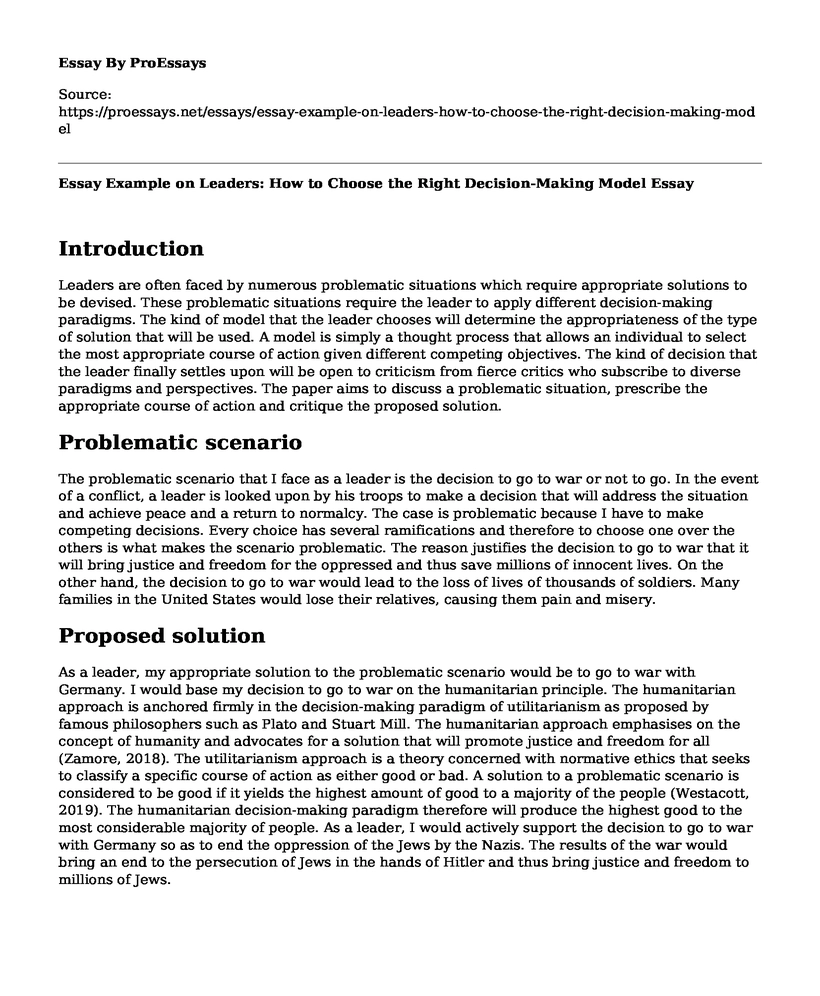Introduction
Leaders are often faced by numerous problematic situations which require appropriate solutions to be devised. These problematic situations require the leader to apply different decision-making paradigms. The kind of model that the leader chooses will determine the appropriateness of the type of solution that will be used. A model is simply a thought process that allows an individual to select the most appropriate course of action given different competing objectives. The kind of decision that the leader finally settles upon will be open to criticism from fierce critics who subscribe to diverse paradigms and perspectives. The paper aims to discuss a problematic situation, prescribe the appropriate course of action and critique the proposed solution.
Problematic scenario
The problematic scenario that I face as a leader is the decision to go to war or not to go. In the event of a conflict, a leader is looked upon by his troops to make a decision that will address the situation and achieve peace and a return to normalcy. The case is problematic because I have to make competing decisions. Every choice has several ramifications and therefore to choose one over the others is what makes the scenario problematic. The reason justifies the decision to go to war that it will bring justice and freedom for the oppressed and thus save millions of innocent lives. On the other hand, the decision to go to war would lead to the loss of lives of thousands of soldiers. Many families in the United States would lose their relatives, causing them pain and misery.
Proposed solution
As a leader, my appropriate solution to the problematic scenario would be to go to war with Germany. I would base my decision to go to war on the humanitarian principle. The humanitarian approach is anchored firmly in the decision-making paradigm of utilitarianism as proposed by famous philosophers such as Plato and Stuart Mill. The humanitarian approach emphasises on the concept of humanity and advocates for a solution that will promote justice and freedom for all (Zamore, 2018). The utilitarianism approach is a theory concerned with normative ethics that seeks to classify a specific course of action as either good or bad. A solution to a problematic scenario is considered to be good if it yields the highest amount of good to a majority of the people (Westacott, 2019). The humanitarian decision-making paradigm therefore will produce the highest good to the most considerable majority of people. As a leader, I would actively support the decision to go to war with Germany so as to end the oppression of the Jews by the Nazis. The results of the war would bring an end to the persecution of Jews in the hands of Hitler and thus bring justice and freedom to millions of Jews.
The critics perspective
The decision to go to war with Germany attracts a lot of criticisms from different quarters that follow a divergent decision-making paradigm. The proponents of the practical approach as a decision-making paradigm, argues against the decision to go to war. According to the practical approach paradigm, the decision to go to war should be the only and final option remaining after all other viable solutions have been applied. The practical approach follows Kant's philosophy of categorical imperative. According to Immanuel Kant, leaders should choose the course of actions that can be universal laws (Chng, 2018).
Those opposed to the decision to go to war, hold that the acts of confrontation are inherently wrong and should not be applied as a means to promote social welfare and freedom. They argue that a leader should be rational and thus desist from promoting acts of violence and confrontations as ways of addressing a war situation. The decision to go to war would bring pain and grief to numerous families whose relatives would lose their lives during the war and as such the ends will fail to achieve social justice and freedom to the grieving families. The humanitarian approach which advocates for utilitarianism is, in fact, wrong, and it produces the undesired consequences of loss of thousands of the lives of our soldiers who put their lives on the line to fight a battle on foreign territory. The decision to wage war against the Germans is not worth it, and it should not be the appropriate course of action due to the massive loss of lives of our soldiers.
Conclusion
In conclusion, a leader needs to be rational to arrive at an appropriate solution to a problematic scenario. In the event of war, it is crucial to weigh the different decision-making paradigms to adopt an ultimate solution that will ensure that the objectives are met with little or no loss of lives. However, there will always arise deep disagreements, and thus, the leader should ultimately make the decision that promotes the general good for the majority of people.
References
Chng, P. (2018, May 4). Kant's Categorical Imperative and The Golden Rule: What's the Difference? Retrieved from Medium: https://medium.com/dialogue-and-discourse/kants-categorical-imperative-and-the-golden-rule-the-fundamental-difference-5776e5b44022
Westacott, E. (2019, May 25). The Basic Principles of Utilitarianism. Retrieved from Thoughts Co.: https://www.thoughtco.com/philosophy-4133025
Zamore, J. E. (2018, August 20). Dangerous Decisions: On the Ideals and Incentives that Guide Humanitarian Decision-Making. Retrieved from Medium: https://medium.com/sdg16plus/dangerous-decisions-on-the-ideals-and-incentives-that-guide-humanitarian-decision-making-ad18f5586135
Cite this page
Essay Example on Leaders: How to Choose the Right Decision-Making Model. (2023, Jan 16). Retrieved from https://proessays.net/essays/essay-example-on-leaders-how-to-choose-the-right-decision-making-model
If you are the original author of this essay and no longer wish to have it published on the ProEssays website, please click below to request its removal:
- Why Do You Do What You Do: Walmart Company Analysis
- Paper Example on Leadership: Dave Ramsey
- Managing Innovation and Entrepreneurship Chapters Analysis Paper Example
- Paper Example on Coca-Cola's Breakthrough Innovation: Innovating the Packaging Process
- Essay Sample on Successful Leadership Techniques for Business Management
- Essay Sample on Employees: Vital for Org Success & Deserving of Leadership Roles
- Essay Example on Table of Contents: Enhancing Effective Project Outcomes







